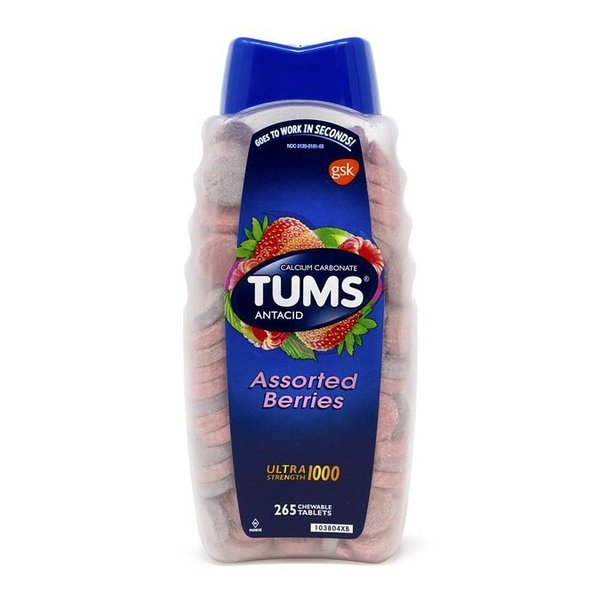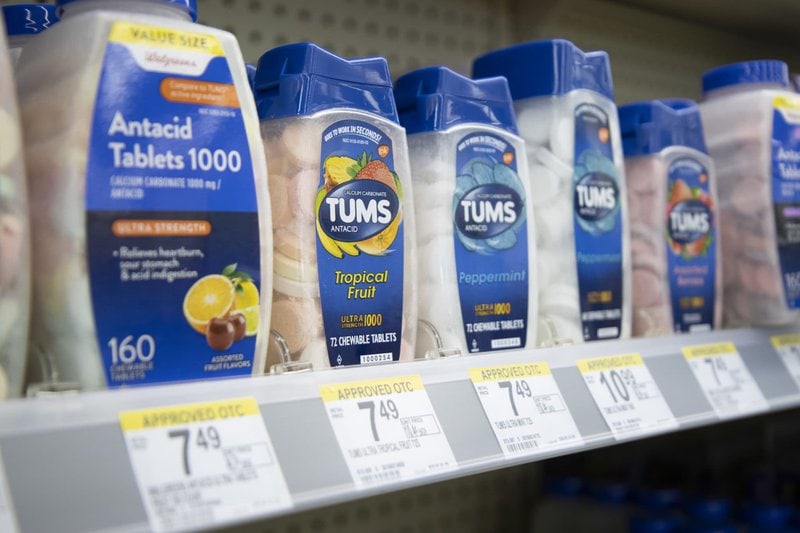When we get gas or indigestion, it is easy to grab some Tums and pop it into our mouths to get instant relief. But is it a good idea to give Fido a pill or two of the antacid when we see it having some stomach issues?
The answer is not a simple yes or no. Under the guidance of your veterinarian, dogs can be given Tums. These pills are antacids with an active ingredient of calcium carbonate that works to neutralize excessive gastric acids. It is used to relieve heartburn, acid indigestion, or an upset stomach.
So, before you reach for that bottle of Tums, read on about its effects on your dog’s body and the possible side effects it could create.
Introducing medications to your dog, whether prescribed or over-the-counter, may not have the same effect on them as on our human body. The advice of your veterinarian should always take precedence.
Are Tums Safe For Dogs?
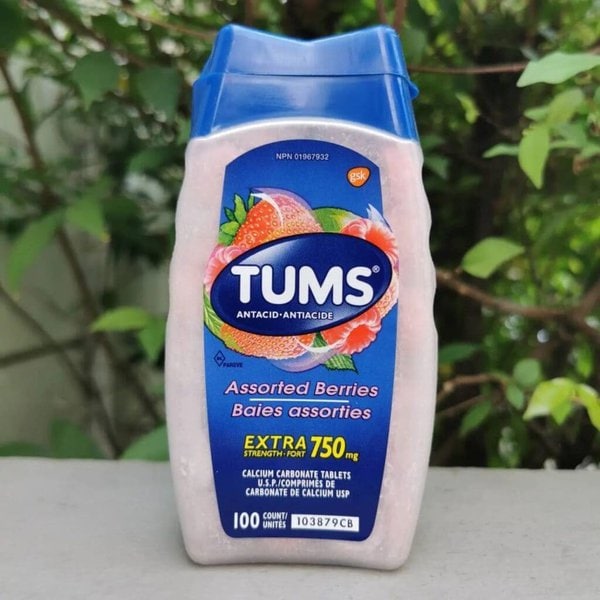
Yes, but again, only under the guidance of a veterinarian. These antacids can be used to address minor stomach issues of our dogs.
While giving a tablet or two of Tums might not cause damage to our dog’s health, there are several reasons why you should refrain from giving it without a vet’s approval and dosage recommendations.
Xylitol
Some varieties of Tums may contain the chemical compound xylitol, which is used as an artificial sweetener.
Xylitol is highly toxic to dogs, and even small amounts can cause hypoglycemia, seizures, liver failure, and possibly death.
Check the labels of any drug or food item to make sure it does not contain this substance.
Kidney Issues
If your dog has any kidney dysfunction, giving Tums can cause hypercalcemia, or abnormally high levels of calcium in the blood, since the kidney cannot properly filter the blood.
Incidentally, dogs with kidney problems also have high levels of phosphorous in their blood. While the calcium component of Tums can be useful to bind with excess phosphorous, it is still not a reliable source of treatment to stabilize phosphorous levels.
Drug Interactions
Dogs who are given medications, such as tetracycline antibiotics or digoxin, should not be given Tums since it interferes with the effectiveness of these drugs.
Danger To Puppies
Excess calcium can affect the bone and cartilage development of puppies.
While they do need more calcium while developing, too much calcium is associated with skeletal growth issues like hip dysplasia.
Pregnant Or Nursing Mothers
It is also not recommended to be given freely to pregnant or nursing mothers because the excess calcium can be passed on to their growing puppies and cause skeletal development issues.
However, some veterinarians may approve the use of Tums for lactating mothers who are suffering from eclampsia, a condition when there is a sudden drop in the calcium level in the blood.
Food Coloring
Some varieties of Tums contain food coloring that may cause an allergic reaction to some dogs.
Plus, there may be some underlying health condition that your dog may be suffering from that you don’t know about. Giving them medications like Tums could worsen the condition or maybe interfere with other drugs that your dog may be taking.
How Do Tums Work?
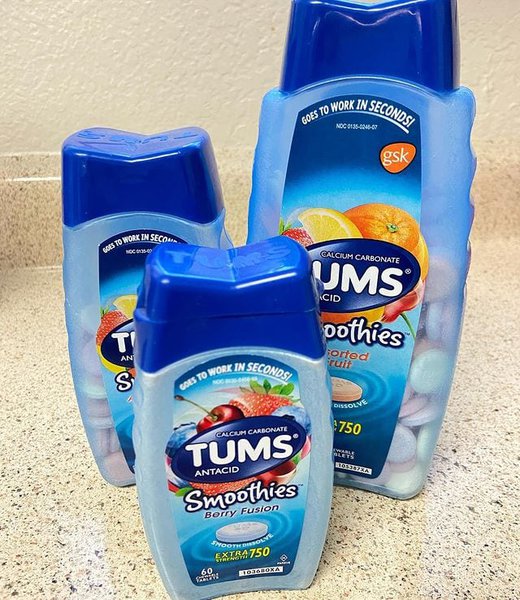
The active ingredient in Tums is calcium carbonate and it works by binding with the hydrogen in the stomach acids, thus raising the pH level. The lower the pH level, the higher the acidity is.
Tums also raise the amount of calcium in the body and limit the absorption of phosphorous by acting as a sponge that soaks up phosphates in the foods that our dogs eat.
But, this antacid does not work as effectively in the dogs’ stomachs as it does with ours.
Yes, there would be some temporary relief for stomach discomfort, but since dogs digest things much faster than humans, the calcium carbonate passes quickly through the digestive tract without much absorption.
How Do I Know If My Dog’s Stomach Hurts?
The reason why most people would give Tums to their dogs is that they think their dogs are suffering from an upset stomach.
But, what are the signs that indeed they are having some stomach troubles like indigestion or acid reflux? Here are some symptoms to watch out for:
- Vomiting bile
- Diarrhea
- Food regurgitation
- Restlessness
- Lip-smacking or gulping
- Decreased appetite
- Teeth grinding
- Excessive flatulence
- Decreased appetite
- Bad breath
How Much Tums To Give A Dog?
The dosage below is just a guideline but seek the advice of a veterinarian before giving your dog Tums:
- Small dogs: 1.25 g of Tums once a day
- Medium-sized dogs: 2 to 4 g of Tums once a day
- Large dogs: 4 to 6 g of Tums once a day
- Extra-large dogs: 6 to 10 g of Tums once a day
What Do I Do If My Dog Ate A Lot Of Tums?
Calcium carbonate is not considered toxic to dogs, so if your dog accidentally ingested a mouthful of Tums, then some stomach upset or constipation may be expected.
But, usually, these symptoms will resolve by themselves in a day or two since Tums don’t get absorbed quickly in the digestive tract.
If constipation becomes unbearable for your dog, the veterinarian may prescribe some stool softeners.
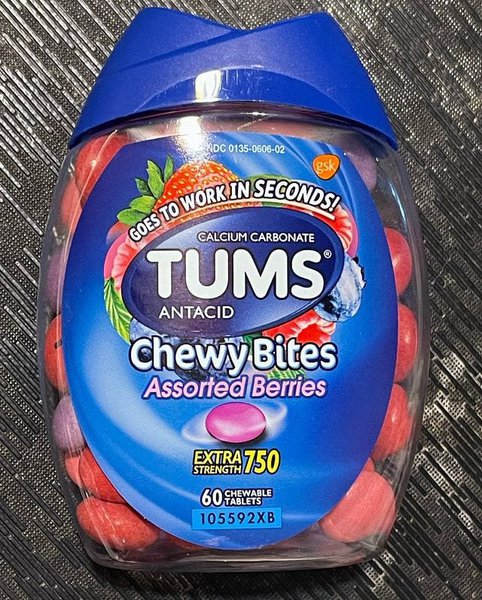
What Other Remedies Can I Give My Dog For Stomach Upsets?
It is important to discuss the issue with your veterinarian regarding stomach upsets. A change in diet or a prescription for other antacids may be recommended.
Special Diet
Most stomach issues are caused by foods that didn’t agree with your dog’s tummy. Maybe you changed brands from its regular food or altered the feeding schedules that are causing the problem.
One great way to normalize its digestive system is to feed your dear Fido with pureed pumpkin. This is a more nutritious alternative to Tums and it would not cause constipation.
You can also try fasting or restricting its food intake for a day then slowly reintroduce light foods like rice or boiled chicken before giving its regular meal.
Probiotics
Introducing good bacteria is also another alternative for stomach ailments.
The gut microbiota or beneficial microbes in the gastrointestinal tract can sometimes get disrupted causing stomach problems.
If your dog is suffering from chronic diarrhea, one option your veterinarian might suggest is supplementing its diet with probiotics. This helps in aiding their digestion and boosting the immune system as well.
Other Antacids
Since Tums are not effective nor strong enough to counter acidity in treating upset stomachs, your veterinarian may prescribe other forms of medication like a proton pump inhibitor (PPI), such as omeprazole, that also reduces stomach acid production.
Another type of drug is histamine H2-receptor antagonists or H2-blockers, such as ranitidine, famotidine, or cimetidine, which also works in minimizing the acid produced in the lining of the stomach.
While some of these drugs may be bought over-the-counter, you should always consult your veterinarian about these medications.
